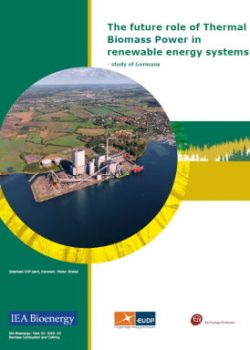The future role of Thermal Biomass Power in renewable energy systems – a study of Germany
 The global energy supply system is in a transition from a centralized system dominated by dispatchable fossil-based sources to a system that is based on renewable energy sources. In countries where wind and solar are expected to play a dominant role in the energy transition, the integration of these energy sources in the power system places pressure on the grid operation as their supply is variable and non-dispatchable. This raises the challenge of balancing demand and supply in the power grid, especially in hours with low generation from wind and solar and given the fact that often these sources are generating when demand is low.
The global energy supply system is in a transition from a centralized system dominated by dispatchable fossil-based sources to a system that is based on renewable energy sources. In countries where wind and solar are expected to play a dominant role in the energy transition, the integration of these energy sources in the power system places pressure on the grid operation as their supply is variable and non-dispatchable. This raises the challenge of balancing demand and supply in the power grid, especially in hours with low generation from wind and solar and given the fact that often these sources are generating when demand is low.
Bioenergy, being a dispatchable form of renewable generation, has the potential to play a key role as a stabilising element in a future green power system dominated by variable renewable energy. Following the interest expressed in the framework of the IEA Bioenergy, Task 32 has decided to further explore the role of thermal biomass power plants in the future, using a system approach.
In this analysis, development of the European power system is projected highlighting a thermal-dominated area, exemplified by Germany. The role of biomass technologies towards 2040 is analysed in two scenarios, Reference and Biomass+, utilizing the Balmorel model, a fundamental mathematical model of power and heat systems reproducing the day-ahead market dispatch and future development of the generation fleet.
This led to the following conclusions:
- The existing and estimated future market conditions alone will not drive any substantial amount of thermal biomass power into the German energy system up to 2040,
- Given favourable framework conditions, thermal biomass power will supply base load electricity and heat for district heating,
- System flexibility services will mainly be provided by other sources such as hydropower, pumped and other electricity storages and gas-fired power units.
The future role of thermal biomass power in renewable energy systems – a study of Germany


